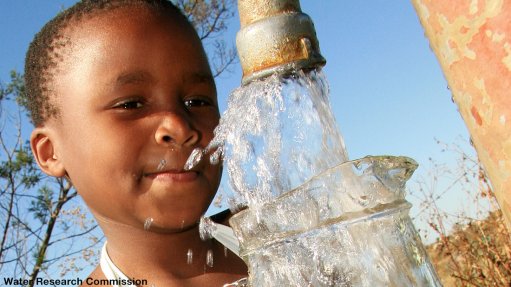
Water and Sanitation Minister Nomvula Mokonyane on Friday said it was imperative to “sort out the hierarchy” of South Africa’s water management, by not only combining the Water Act and the Water Services Act, but prioritising policy reform on water and sanitation in the country.
Rand Water earlier this week warned residents of the City of Johannesburg, City of Tshwane and Ekurhuleni metropolitan municipality that persistent high temperatures in its area of supply were placing strain on its bulk water supply system and, paired with the lack of rainfall, were projected to cause localised problems in these areas.
Rand Water noted that the state of its bulk supply was “concerning, but stable” and that it was in discussions with its municipal customers to jointly manage the situation.
In a post-Cabinet meeting release, government also urged residents in KwaZulu-Natal to adhere to water restrictions, as the province experienced its worst drought in years.
It said South Africans could save water by not using a hosepipe to wash cars, watering gardens in the evening, monitoring water metres for high consumption and fixing water leaks.
Speaking at a business breakfast hosted by the Johannesburg Chamber of Commerce and Industry, the Minister highlighted that local municipalities had always been the local authorities on water management.
“On what basis?” she asked, noting that it was based on the assumption that as local governments were closer to communities, they should be in charge of the water and sanitation value chain.
“There are few municipalities that have that management capacity,” Mokonyane said, adding that, through policy reform, the Water and Sanitation Minister would have full oversight and authority on the value chain.
She further noted that, to tackle the challenges of water supply in areas where water mismanagement had been rife, including the North West province, drought-stricken KwaZulu-Natal and the Eastern Cape, her department intended to implement its proposed 15-year Master Plan before year-end.
This was aimed at tackling water security, the unsustainable use of water and the pollution of fresh water systems, as well as managing shared water courses and basins and erasing uncoordinated institutional linkages.
She pointed out that the department had identified 27 districts in North West, KwaZulu-Natal and the Eastern Cape where intervention was urgently needed to correct water shortages. The Madibeng municipality, in the North West, was one such area.
“It was comfortable for us over the past 20 years to throw money into the Hartbeespoortdam in the Madibeng district, but the solution is in rehabilitating all the province’s pipelines – not half-heartedly.
“We must take the jurisdiction over water from those municipalities as they can hardly raise revenue, as a result of their status,” Mokonyane said, adding that these municipalities were in no position to ask for funds from institutes such as the Development Bank of Southern Africa (DBSA).
The Minister noted that by pooling and centralising the issues and by showing the DBSA a well-constructed maintenance plan, these problems could be rectified.
“We don’t want money to sort out just the Hartbeespoortbam, we want money to sort out the bulk infrastructure in the North West and parts of Pretoria,” she added.